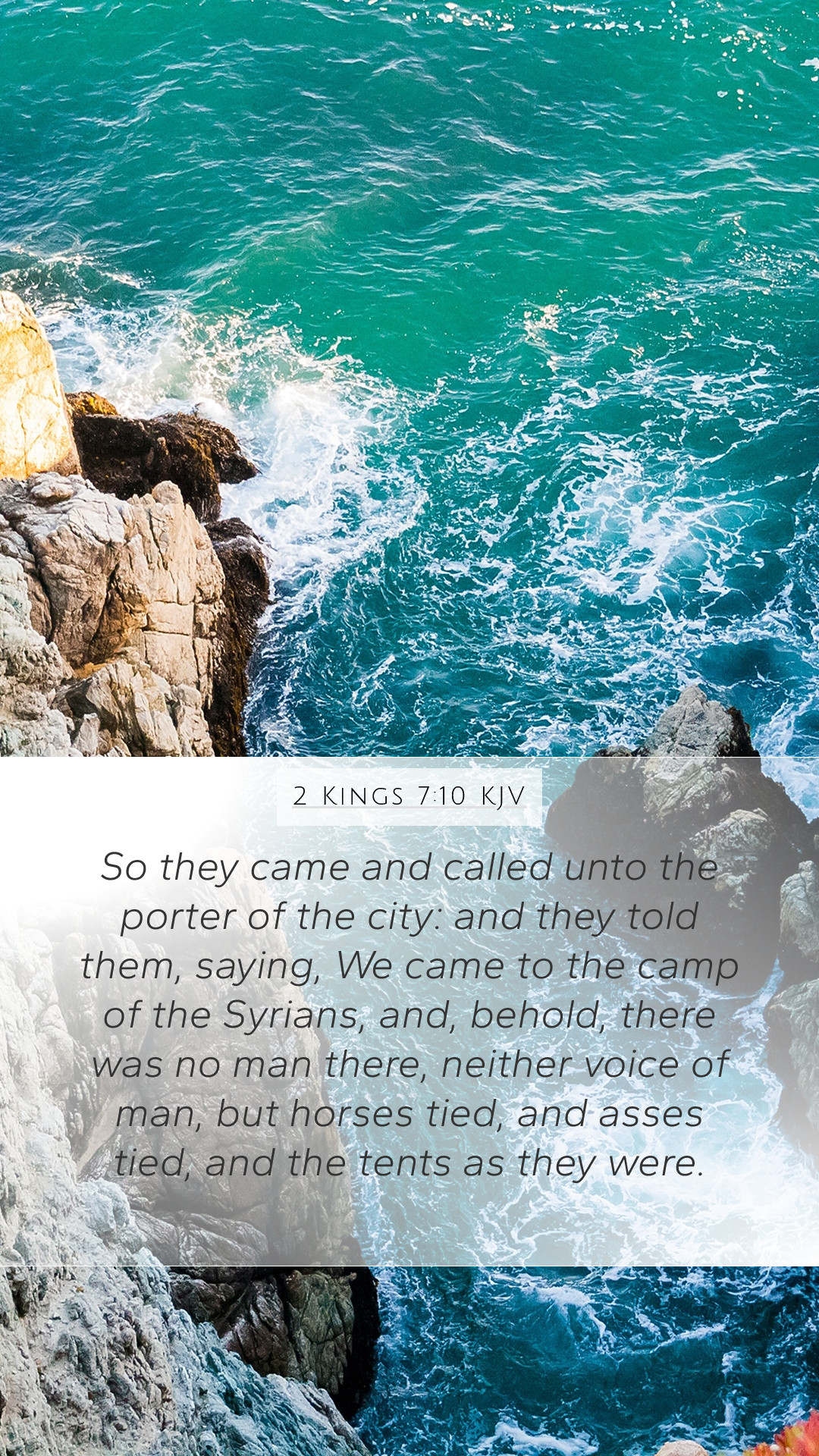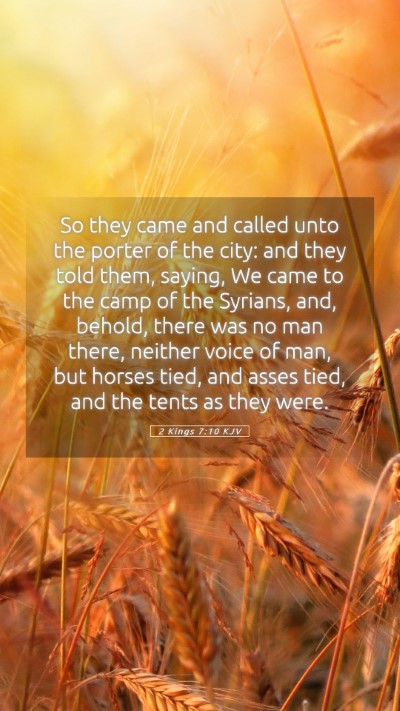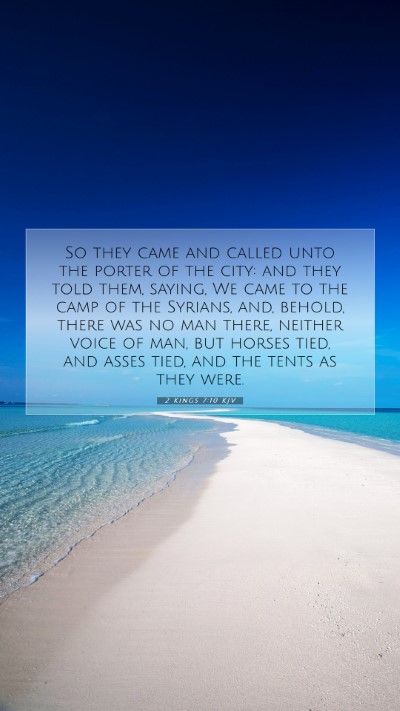Old Testament
Genesis Exodus Leviticus Numbers Deuteronomy Joshua Judges Ruth 1 Samuel 2 Samuel 1 Kings 2 Kings 1 Chronicles 2 Chronicles Ezra Nehemiah Esther Job Psalms Proverbs Ecclesiastes Song of Solomon Isaiah Jeremiah Lamentations Ezekiel Daniel Hosea Joel Amos Obadiah Jonah Micah Nahum Habakkuk Zephaniah Haggai Zechariah Malachi2 Kings 7:10 Meaning
What is the meaning of 2 Kings 7:10?
So they came and called unto the porter of the city: and they told them, saying, We came to the camp of the Syrians, and, behold, there was no man there, neither voice of man, but horses tied, and asses tied, and the tents as they were.
2 Kings 7:10 Bible Verse Meaning
Understanding 2 Kings 7:10
The verse 2 Kings 7:10 is a significant moment in the prophetic narrative of Elisha, where the people of Samaria discover the abundance that God has provided amidst a dire situation. In examining this verse, we can draw insights from various public domain commentaries, particularly those of Matthew Henry, Albert Barnes, and Adam Clarke, to illuminate its meaning.
Context of 2 Kings 7:10
This verse occurs during a time of great famine in Samaria, a consequence of siege by the Arameans. The dire condition had led to desperate measures among the populace, reflecting both physical scarcity and spiritual trials. The preceding verses recount how God used the lepers to bring good news to the city, highlighting themes of hope and divine provision.
Matthew Henry's Commentary
Matthew Henry emphasizes the providential care of God during crisis situations. He notes that the four lepers, having discovered the deserted camp of the Arameans filled with food and provisions, chose to share this good news with the city. Their actions illustrate the importance of recognizing and acting upon God's deliverance:
- Faith in Action: Henry points out that their faith resulted in tangible blessings for the people of Samaria, demonstrating how divine provision often arrives through unexpected means.
- Community Responsibility: The lepers’ decision to inform the city speaks to the ethical duty of sharing good news and blessings with others, especially those in need.
- Divine Timing: God orchestrates events to lead His people to restoration, preaching that hope is vital even in hopeless situations.
Albert Barnes' Commentary
Albert Barnes provides an analytical approach to this verse, drawing attention to the dramatic shift in circumstances from despair to relief. He comments on the following:
- Prophetic Fulfillment: Barnes notes that the events unfold as a testament to the prophecy that Elisha delivered, highlighting God’s sovereignty and the fulfillment of divine promises.
- The Role of the Outcast: The lepers, who were social outcasts, become instruments of God's mercy, suggesting that God can use anyone, regardless of their societal status, to fulfill His plans.
- Hope in Despair: Barnes underscores the transformation from famine to feasting, teaching that God's deliverance often comes when least expected.
Adam Clarke's Commentary
Adam Clarke presents a theological insight into the verse, emphasizing the character of God as a provider and sustainer. His observations include:
- God's Intent: Clarke asserts that God's intervention was not merely about physical sustenance but also a restoration of hope and faith for the Israelites in Samaria.
- Social Ripple Effects: The news spread rapidly, causing a societal shift, demonstrating how individual actions can have wide-reaching impacts.
- Biblical Symbolism: The abundance found in the camp represents the richness of God’s grace available to all who seek Him, even in times of judgment and trial.
Cross References
2 Kings 7:10 can be related to various other scripture passages that illustrate similar themes of hope, provision, and divine intervention:
- 1 Kings 17:8-16: The story of Elijah and the widow at Zarephath highlights God’s provision during famine.
- 2 Samuel 22:31: A reflection on God as a shield and deliverer, affirming His protective nature.
- Isaiah 41:17: God promises to help the poor and needy, reinforcing the theme of divine care for the marginalized.
Conclusion
In summary, 2 Kings 7:10 encapsulates a profound moment of divine intervention and the emergence of hope amid despair. Through the insights derived from the commentaries, we gain a deeper understanding of the richness of God’s providence and the importance of sharing that hope with others. Engaging with this verse provides valuable lessons for both personal reflection and communal faith, essential for any Bible study group or individual seeking Bible verse explanations and understanding Scripture.


